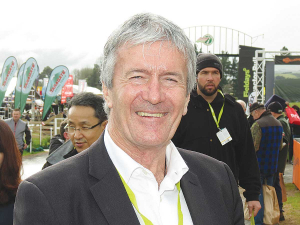M.I.A.
OPINION: The previous government spent too much during the Covid-19 pandemic, despite warnings from officials, according to a briefing released by the Treasury.
 Damien O'Connor now has the trade job, on top of agriculture, as his ministerial responsibilities in the new government.
Damien O'Connor now has the trade job, on top of agriculture, as his ministerial responsibilities in the new government.
Trade Minister Damien O'Connor says he and other trade ministers around the world will need to get used to developing relationships via Zoom.
O’Connor, who is also the Agriculture Minister, told Rural News that Covid-19 will limit the normal face-to-face encounters between NZ politicians and their counterparts around the world and they will just have to get used to the new environment and do the best they can.
O’Connor praised his predecessor David Parker for the relationships he has developed with other trade ministers over the past three years and says he will do his best to build on this.
“I guess there will be more calls at all hours of the day across the world to remind people that we still exist and are committed to get around the table and do a deal,” he told Rural News.
“Nothing good comes easy, and as a small nation at the bottom of the Pacific we have always had to battle hard to get access and be heard. We have done well and I hope to continue with that. We are regarded as honest brokers who are up-front and treat people as equals and I will continue to do that,” O’Connor says.
At present, NZ has a number of negotiations under way – specifically an FTA with the EU and a similar preliminary negotiation with the UK, which aside from the normal trade differences are further complicated by the impact of Covid 19. This uncertainty is further complicated – although maybe for the better – with the election of Joe Biden as the US President elect.
O’Connor is now in a unique position in the Labour Government’s new cabinet line-up with his combined portfolios of agriculture, and now trade and export growth. In that sense, he has control over the primary sector from paddock to plate.
“I am very excited, happy and humbled to be given the opportunity to contribute positively in these crucial areas of the NZ economy,” he told Rural News.
“We are a nation of food and fibre producers and 95% of our efforts all have to go offshore so that we can survive. There are too few of us to consume the production that we generate and we have to knock on doors and ask governments to allow their people to buy our products.”
O’Connor believes there is a growing recognition across the primary sectors that consumers drive the success of NZ primary producers. He takes up his new roles at a time when worldwide there is a lot of protectionist views being expressed.
“But because of Covid, there is also a growing awareness of food security and the interdependence between the trade of food between countries and the production of food within them,” he says.
The World Wide Sires National All Day Breeds Best Youth Camp Best All Rounder plaudit has become family affair, with 2026 Paramount Cup winner Holly Williams following in her sister Zara's footsteps.
DairyNZ is giving New Zealand farmers a unique opportunity to gain hands-on governance and leadership experience within the dairy sector.
Herd improvement company LIC has posted a 5.2% lift in half-year revenue, thanks to increasing demand for genetics.
According to the latest Fresh Produce Trend Report from United Fresh, 2026 will be a year where fruit and vegetables are shaped by cost pressures, rapid digital adoption, and a renewed focus on wellbeing at home.
The Roar is a highlight of the game hunting calendar in New Zealand, with thousands of hunters set to head for the hills to hunt male stags during March and April.
OPINION: The past few weeks have been tough on farms across the North Island: floods and storms have caused damage and disruption to families and businesses.